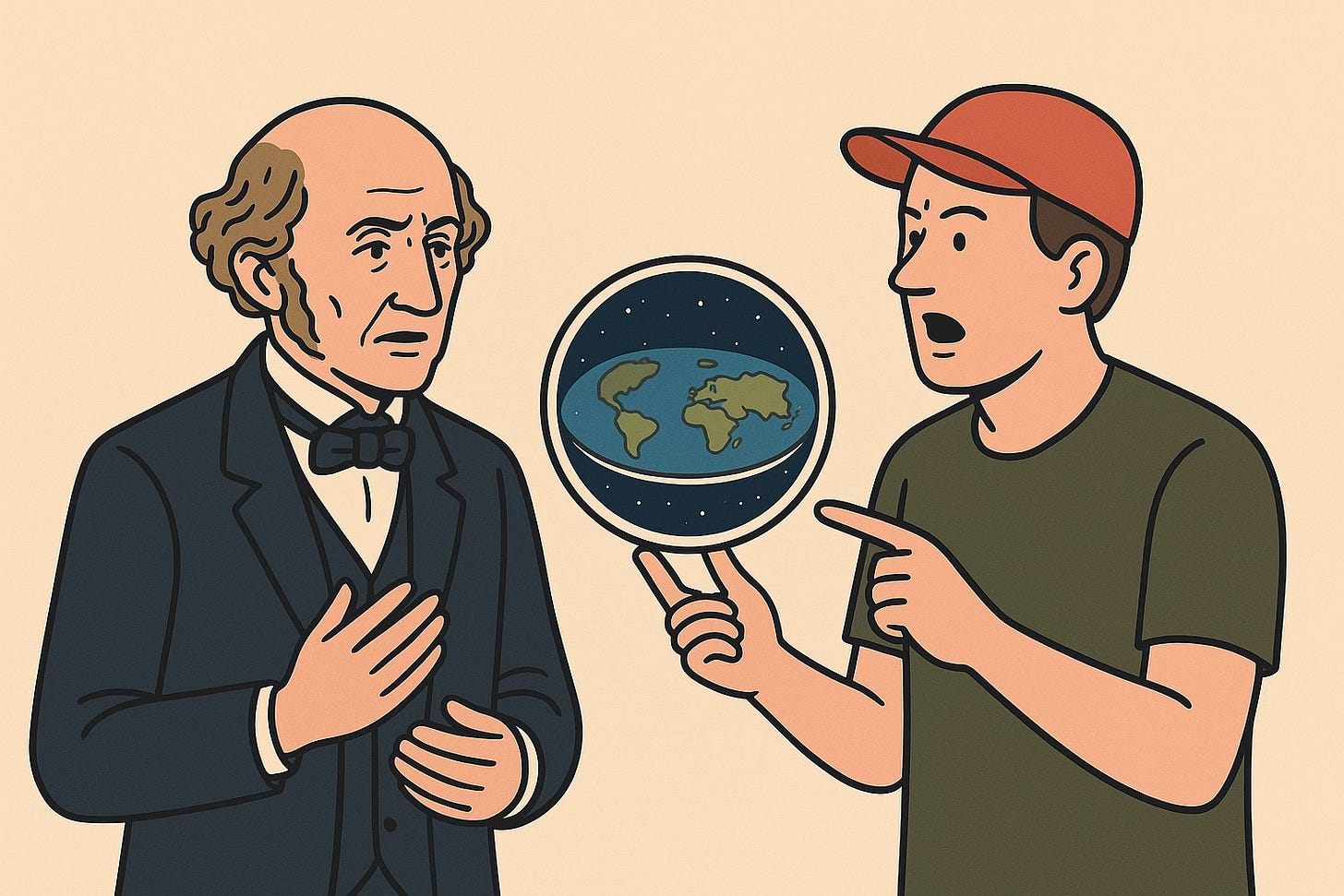A Liberal's Guide to Moving On
With a new academic year now underway, I have a lot of material to write about on Substack; now I just need to find the time!
On Tuesday, in my first class of the semester, the students had a lively debate about the limits of toleration … though perhaps not in the way you might imagine. They weren’t interested in figuring out when they could “cancel” someone or how much “viewpoint diversity” we need to seek out for inclusion in our discussions. Instead, they argued about when we could just say that we’ve dealt with a bad idea and move on. That’s the hard question for liberals to definitively answer: at what point can we just … stop?
Liberalism has what feels like a bit of a self-destructive streak. It defines itself by openness, tolerance, and debate, which are really lovely ideals right up until you find yourself trapped in an hour-long conversation with your uncle about how LBJ teamed up with Nixon to fake the moon landing. At its core, liberalism is committed to an unobstructed marketplace of ideas because, following thinks from Thomas Jefferson to John Stuart Mill, if we put all of our opinions on the table, the good ones will stand out to us and the bad ones will fail.
Liberal political thought should, I think, hold at its core a kind of collective humility: we assume that none of us has a monopoly on truth, and therefore, everyone deserves to be heard. Mill put it so nicely in On Liberty: even a false idea has value because confronting it sharpens our understanding of the truth. In a healthy, shared information environment, bad ideas collapse under the weight of evidence. If someone claims the Earth is flat, you can provide good arguments and eventually they’ll concede (or at least their argument will fail to convince anyone else).
The problem is that, in practice, the people in our “marketplace” now look less like Socrates in the bustling Athenian agora and more like Facebook commenters at 2 am. And some ideas just refuse to quietly fail when confronted with evidence or better arguments; they keep on going and even get worse. Then liberals, being committed to engagement, often find themselves stuck in an endless loop of debate, dutifully fact-checking and counter-arguing long after it’s clear the other side isn’t arguing in good faith. In an era of algorithmic amplification, bad ideas get boosted rather than defeated precisely because they generate outrage, clicks, and money. The liberal instinct to engage and correct these bad ideas is actually feeding the machine.
Not only does engagement boost bad ideas, it’s also clear that some people with illiberal ideas have figured out that liberals can’t say no to a debate. We’ve seemingly come to the conclusion that if someone wants to talk, we have to talk. Of course, some people want to learn, to explain their ideas, to hear our ideas, and to understand. They’re even open to being persuaded. Others just want to destabilize. If you can’t tell which kind of conversation you’re in, you’ll spend a lot of time arguing with people who are not, in fact, arguing back. Think about election conspiracy theorists. There’s seemingly no amount of recounts, audits, court cases, or sworn testimony that can convince a segment of the American electorate that an election that happened half a decade ago wasn’t fraudulent. We keep engaging with this idea as if another fact-check will do the trick, but someone on Twitter who went down a YouTube rabbit hole isn’t even playing the same game we are. They aren’t trying to convince us anymore; they’re just keeping us busy.
Liberal democracy can’t thrive if it treats every bad idea as an eternal open question. At some point, we have to be willing to say: the evidence is settled, the debate is over, and our energy is better spent elsewhere. That’s not an illiberal reaction so much as it’s a simple refusal to be trapped in someone else’s endless game. We have finite time and energy. Every hour spent revisiting the same bad-faith argument is an hour not spent strengthening institutions, protecting rights, and advancing policies grounded in reality. So the idea that we might stop litigating the same debates over and over on a seemingly endless loop is really about reallocating resources.
If liberals are going to step back from endlessly debating bad ideas, they have to step toward something else. Walking away from the noise is only useful if we’re walking toward a louder, clearer, more compelling vision of what liberalism offers. Instead of constantly playing defense—responding to every attack on liberal institutions—we should spend more time showing how they actually improve people’s lives. Why does a free press matter? Because it exposes corruption and holds power accountable. Why protect an independent judiciary? Because those courts safeguard rights when majorities turn hostile. Why defend checks and balances? Because concentrated power is dangerous.
In addition to these institutions, we should also loudly and proudly promote liberal rights and values. These include, but certainly aren’t limited to, the right to speak without fear; the freedom to live according to your beliefs without coercion; the protection of minorities against the tyranny of majorities; and the idea that every person has inherent dignity and an equal right to shape the society in which they live.
Making this affirmative case for liberalism isn’t a retreat from debate; it’s a refocusing of what that debate should look like. If we stop pouring so much of our energy into trying to refute every conspiracy theory, we can finally invest it where it matters: making a clear, passionate, unapologetic case for why liberalism remains the political philosophy that works best to ensure a stable society in which more people can accomplish more of what they hope to achieve for themselves.


